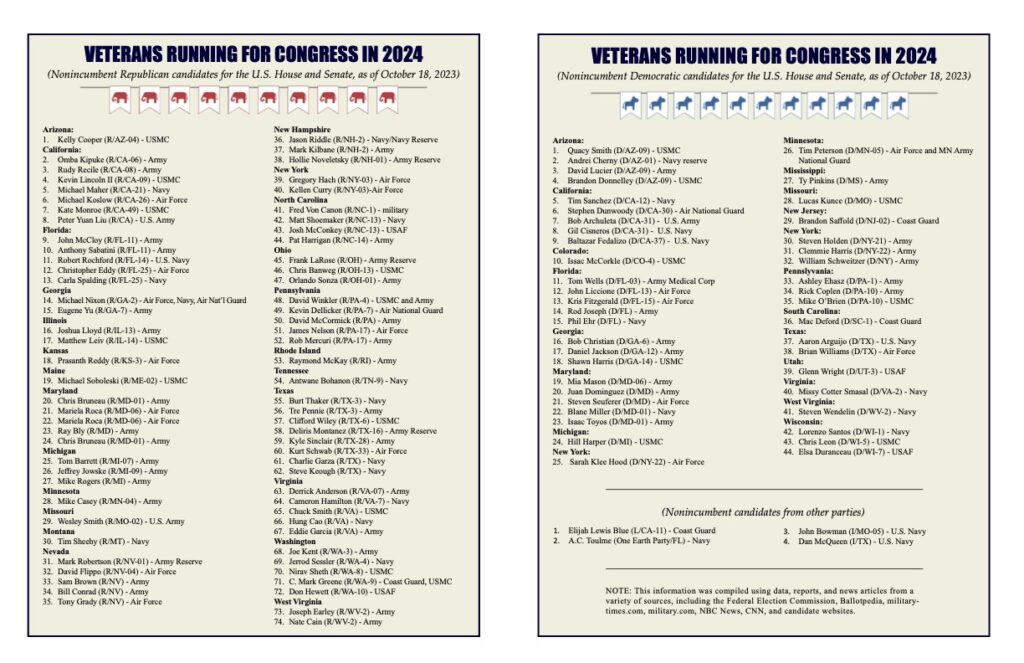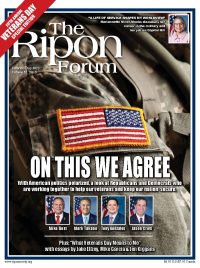
With Veterans Day upon us and the 2024 campaign just over a year away, it is a good time to reflect on the political and civic engagement of America’s military veterans and the implications of their participation for the U.S.
This essay aims to explore the multifaceted landscape of voting preferences among veterans, the factors that drive their active engagement both politically and civically, and the barriers that may prevent veterans from participating effectively as citizens.
How veterans can engage in our society today has the potential to reshape the future of our nation’s leadership.
The Veteran Vote
Military veterans are often portrayed as being a voting bloc in American politics. Some of this reputation is warranted, as surveys and research support that, with a few exceptions, veterans are more likely to be registered to vote compared to their non-military peers and have consistently higher rates of voting.
In the 2022 elections, turnout rate among veterans was 62.7% compared to 51.3% of nonveterans.
In the 2022 elections, for instance, turnout rate among veterans was 62.7% compared to 51.3% of nonveterans. Because of these higher turnout rates, candidates and parties tend to “court” the veteran vote by putting other veterans on the ballot (see related chart below) or focusing on policy platforms that are favored by military veterans. Whether veteran voters will turnout at an even higher rate in the next election cycle will highly depend on whether parties have high quality candidates and sensible policy platforms that can find resonance with the majority of military veterans.
Critical Issues Guiding Candidate Choices
Delving into the voting patterns of the veteran population reveals a complex interplay of factors shaping their candidate choices.
Among post-9/11 veterans, the most important topics leading veterans to support a candidate were veteran issues (47%), the economy (36%) and gun control/Second Amendment rights (27%). The veteran issues that were seen as the most important to the post-9/11 generation were mental health and suicide prevention (70%), employment and jobs (39%) and toxic exposure or burn pits (33%). Topics such as military and defense issues, government and tax reform, homeland security and terrorism, and healthcare were also top issues for more than 1 in 5 post-9/11 veterans.
Veterans, drawing from their diverse experiences both in and out of the military, tend to gravitate towards candidates who align with their views on these critical topics. The deep-seated understanding of far-reaching implications of policy decisions, such as those on foreign policy, might influence veterans to be more discerning in their choices.
Elevated Civic Engagement of Veterans
Research shows that both in history and today, veterans, as a group, exhibit levels of civic engagement that consistently outshine those of nonveterans. This heightened commitment is particularly evident in their enthusiastic participation not only in terms of electoral politics, but in terms of volunteerism within their communities.
Among post-9/11 veterans, the most important topics leading veterans to support a candidate were veteran issues (47%), the economy (36%) and gun control/Second Amendment rights (27%).
On average, veterans spent 95 hours volunteering a year compared to 74 hours for non-veterans. Reasons behind this propensity could be manifold, including a strong sense of duty instilled during their military service, a commitment to upholding the democratic values they defended, and a desire to have a tangible impact on the nation’s direction.
Barriers to Participation
Despite their keen interest in voting and civic engagement, veterans may face obstacles such as logistical challenges to participating politically. Furthermore, they may also feel disengaged from their local communities even though they have a desire to be civically engaged. Military service involves frequent relocation, and the demands of the Mission may not allow time for service members to be connected to their local communities.
While many service members desire to move back to their home of record upon separation, a good portion of transitioning service members will move or stay near their last duty station. The veterans that stayed within their “new” communities are essentially rebuilding their sense of belonging. Their commitment to the political process, volunteerism, and civic ideals may be in flux during this transition process as they (re)register to vote, change their state residency, learn about veteran-related resources, and finding a new place for themselves and their families within the community. How state and local governments can ease the transition process for veterans will have an impact on whether veterans can flourish post military service.
We are at a point in American history where only 7% of the U.S. population are military veterans. The proportion of veterans serving in Congress is also at an historic low despite efforts from both major parties to recruit veterans as political candidates. The reasons behind these trends are mostly structural, and are driven by policy decisions such as moving to an all-volunteer force and smaller military conflicts over the last 50 years.
Whether these trends continue is unknown. However, one things is certain — veterans are and will remain an integral part of our society, and their higher propensity to participate both politically and civically are an asset and something we should leverage as a nation.
Rosalinda Vasquez Maury serves as the Director of Applied Research and Analytics at the D’Aniello Institute of Veterans and Military Families (IVMF) at Syracuse University. Jeanette Yih Harvie and Adam Pritchard are Research Associates at the IVMF.
_____________________





